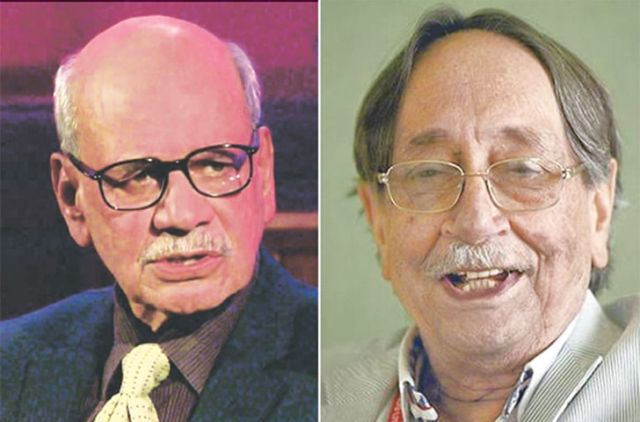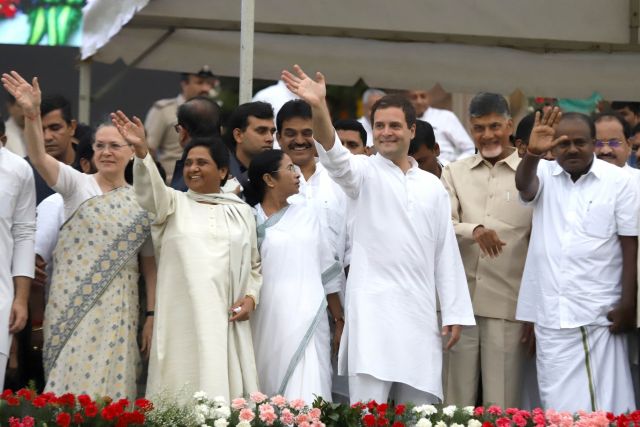
by admin | May 25, 2021 | Interviews

Former RAW chief A.S. Dulat (right) and ex-ISI chief Lt Gen Asad Durrani
By Sarwar Kashani and Saket Suman,
New Delhi : At a time when the India-Pakistan border is crackling with persistent gunfire with mounting casualties on both sides, former Indian intelligence chief A.S. Dulat has floated a disruptive proposal – invite Pakistan Army chief General Qamar Javed Bajwa for a dialogue to reduce tension and talk peace.
Dulat said General Bajwa was making all the “right noises”, referring to his April remarks that disputes, including Kashmir, between India and Pakistan can be solved only through peace talks.
“We should invite General Bajwa, the army chief. He has been talking peace and also a lot of our frustration in our dialogue with Pakistan is because we feel frustrated by the armed forces or what we call the ‘deep state’ — the ISI or the army. Therefore, why not talk to the army chief directly? He is talking reasonably now. Why not invite the army chief, just an idea,” Dulat told IANS in an interview at his south Delhi residence.
India has maintained that it will talk only to the elected civilian leadership in Pakistan and has shunned talking to the Pakistani military, which however controls key decision-making on foreign policy – particularly with respect to India – and security in the Pakistani establishment.
Dulat served as chief of India’s Research and Analysis Wing (RAW), the country’s external intelligence agency, from 1999 to 2000 and was a close aide of then Prime Minister Atal Bihari Vajpayee on Kashmir affairs from 2001 to 2004.
He has participated in a somewhat unique book of dialogues, “The Spy Chronicles – RAW ISI And The Illusion Of Peace” with his once rival, former Pakistani spy chief Lt. Gen. Asad Durrani (retd).
The book throws light on Kashmir, and a missed opportunity for peace; Hafiz Saeed and 26/11; Kulbhushan Jadhav; surgical strikes; the deal for Osama bin Laden; how the US and Russia feature in the India-Pakistan relationship; and how terror undermines the two countries’ attempts at talks.
Dulat, who has previously authored “Kashmir: The Vajpayee Years”, said “not talking to Pakistan is a sort of a handicap” more so at a time when geo-political landscape was witnessing a new churn.
“There is a lot happening in the world around us and they are all taking interest in this particular region. The Americans have a big interest in Pakistan and in Afghanistan.
“Likewise now, the Chinese, the Russians and the Iranians have all developed interest and we need to take note of that and in that, I think, not talking to Pakistan will not help,” he said.
But is it wise to extend an invitation to the Pakistani army chief, particularly at this juncture when ceasefire violations across the frontier have killed scores of civilians and over 40,000 residents were forced to flee their homes from the border areas in Jammu?
“Isn’t it more reason that we should talk,” Dulat asked, adding: “You are presuming that all these cease-fire violations happen only from the Pakistani side and only our people are suffering.
“There is a their side of the story also, it can’t be one-sided. If there is firing from one side, the Army or the BSF is bound to respond.”
Dulat, who served in Kashmir as the Joint Director of the Intelligence Bureau from 1988 to 1990, maintained that “there is no military solution” to the seven-decade old conflict that has killed tens of thousands of people and triggered two wars (1948 and 1965) and a prolonged military skirmish (1999) between the two nuclear-armed powers.
“There is only so much that the army can do; after that it is time for the politicians to play their part,” he said.
The former spymaster also noted that there was no space for big-brotherly attitude in bilateral relations, suggesting that Prime Minister Narendra Modi should revisit his hardline stance against Pakistan.
“The trouble with Modi is, because India is a big country (there is no doubt about it), we want things on our terms but bilateral relationships do not work in this way. We should not ask ‘isme mere liye kya hai’ (What does it hold for us?)
“Once you start talking to Kashmiris, there is a lot for you. You should try this and see what all is in store for you.”
He said most things in the Modi government were related to elections but still expressed a “feeling” of a breakthrough on Kashmir before the 2019 Lok Sabha elections that are due in May.
“Somewhere I have a feeling that something will happen. It’s just a feeling. I am not in government. But I have a feeling.”
(Sarwar Kashani and Saket Suman can be contacted at sarwar.k@ians.in and saket.s@ians.in)
—IANS

by admin | May 25, 2021 | Opinions
 By Saeed Naqvi,
By Saeed Naqvi,
Two mutually reinforcing images from last week may well define the next phase in national affairs. It is too early to call them game changers but they have considerable potential.
The most comprehensive array of opposition leaders, almost a record, who assembled in Bangaluru for H.D. Kumaraswamy’s swearing in as Chief Minister of Karnataka, is significant because it happened despite the contradictions inherent between the various groups in that galaxy.
The occasion produced the man and he better be noticed: Kunwar Danish Ali, the Jamia Millia educated, JD-S spokesman, carried sufficient credibility on both sides to swiftly stitch together the Congress-JD-S alliance in the state. This became the platform on which stood India’s non-BJP diversity. In stitching this extensive hem too, Danish Ali is being applauded by those who know.
Muslims in politics are either too weather beaten or “too Muslim” to navigate diversity. Danish Ali, in my view, is a political animal with a wide reach and one who keeps his faith intensely private. We should hear more about him should the Karnataka experiment remain intact.
The other iconic image was, quite curiously, of a book release. It must have been a few hours of grave national danger, because seldom has the well appointed auditorium of the Claridges hotel been more packed with spies, past and present. For its sheer audacity, Spy Chronicles, RAW, ISI and the Illusion of Peace, is by itself a thrilling title, but when the authorship comes out in sharp silhouette, the revelation takes one’s breath away.
A.S. Dulat, former chief of RAW, and Gen. Asad Durrani, former head of Pakistan’s Inter Services Intelligence (ISI), have put their heads together and have, without compromising fidelity to their respective oaths of office, produced a 320-page document which must now onwards inform those in the subcontinent shaping policy on Kashmir and India-Pakistan relations.
The high-powered congregation in Bengaluru and the brave effort of the Dulat-Durrani duet, both respond to the same national quest – a softer more humane sub continent. Alas, a calmer India, on its own, divorced from the sub continent, is just not possible. It is, likewise, not possible for Pakistan. 1947 was both a blessing and a curse. We could define our separate nations according to our lights but we were also yoked together by geography from which proceed historical and sociological currents which flow forward but also regurgitate into the past.
The first concerted effort to wrench away from the subcontinental centre of gravity came from Pakistan’s dictator, General Zia ul Haq. His push for Nizam-e-Mustafa invited nascent Islamophobia which has metastasized into the modern horror.
Just when fluctuations in Indo-Pakistan ties give way to a seemingly interminable hostility comes the Dulat-Durrani intervention, opening a ventilator in an otherwise suffocating hothouse.
What the book touches on is, in effect, the nub of the matter. Indo-Pakistan initiatives flounder on that ubiquitous document meant for the principal, say, the Prime Minister, marked “for eyes only”. If the Deep State on both sides is the obstacle, why not allow spymasters on both sides to sort out the cobwebs which the principals cannot?
Leftovers from Partition are Kashmir, Pakistan, Hindu-Muslim tensions. If tense communal relations are a requirement for the politics of Hindu consolidation, it follows, as night follows the day, that Kashmir and Indo-Pakistan relations must simmer in perpetuity. They have been placed on auto by our own hands.
To obviate communalism as an essential requirement for electoral politics, it is essential that the motley political crowd on the podium in Bengaluru is regularized. Many societies called it a rainbow coalition.
Both, pre-requisite and a consequence of the Bengaluru experiment is precisely this: tone down social disharmony which communalism aggravates. This end is unachievable without the Dulat-Durrani initiative taking off. Social disharmony, it needs to be stressed, is the overarching malaise under which communalism is played. That is why one photograph that came out of the Bengaluru assembly is epochal – Sonia Gandhi leaning her head against Mayawati’s.
It may be odd to remember Urdu poetry at this juncture but do indulge a line. The most graphic poet, Mir Anis, describes cosmic tumult in which two mutually hostile creatures come together in the face of common danger:
“Shaheen o kabk chhup gayey
Ekja mila ke sar”
(Facing danger, the falcon and the dove put their heads together in the thicket)
Considering that the Congress lost its deposit in the March by-elections in Uttar Pradesh’s Phulpur and Gorakhpur constituencies, Sonia Gandhi would be seen to be in requirement of the BSP supremo, Mayawati’s help. Mayawati may not have been the winner but it was with her help that Akhilesh Yadav’s SP won the two seats.
In this situation what would one make of Congress Election Chief in Madhya Pradesh Digvijay Singh’s statement from Bhopal. He dismissed any tie up with the BSP. Neither was Sonia’s photograph with Mayawati an announcement of a tie up, nor does Digvijay Singh’s reported statement scuttle it. This non-story is only a precursor to what is in store: political busy bodies will load a triangular situation – Congress, BSP, SP – with such heavy voltage speculation that some strand somewhere will snap. The process of coalition building will only be partly in the hands of the principals. To a large extent the process will be conditioned by the din surrounding it which will create misgivings all around as in rapid fire magazines.
The Dulat-Durrani initiative will be subjected to an even more severe ordeal by fire, at least upto 2019. The events of last week provide hope which will generate its opposite – the Pulley principle.
(A senior cmmenator on political and diplomatic affairs, Saeed Naqvi can be reached on saeednaqvi@hotmail.com . The views expressed are personal.)
—IANS


